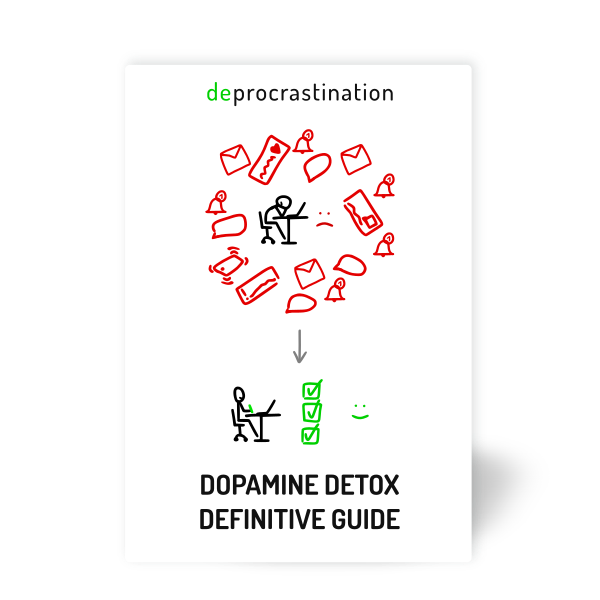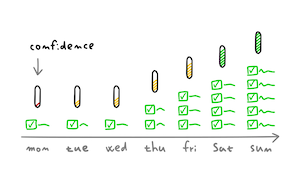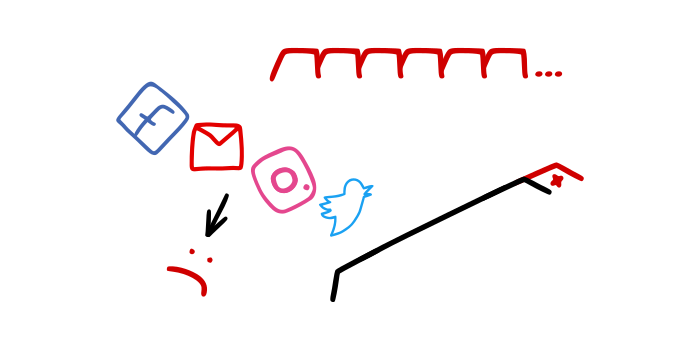How to quit playing video games

In the previous part we talked about why you should quit obsessive gaming. If you decide to do so, there are two ways to do it: gaming in moderation or quitting cold turkey.
If you’re addicted to gaming, moderation from the get-go is very difficult. That’s why you have the problem in the first place. Addiction is defined by an inability to control yourself, therefore most people who try to go from obsessive to moderate gaming usually fail.
A more effective way is to quit cold turkey for a certain period of time. This helps you rethink your relationship with gaming and also helps you break the equation “free-time = game-time”. It has to be at least 30 days but I have found quitting for 90 or 100 days is usually the most effective because it’s long enough to reshape your whole life. If you think 90 days are too daunting, go for 30.
To be able to do this, you will require strong motivation. You also need real reasons to undertake this challenge. Maybe you’re really dissatisfied with your life in the moments you aren’t playing, or maybe you realize all the detrimental effects gaming has on your life and you decide to do something about it. Your reasoning might even be as simple as “if I can’t quit, it means I really need it.”
If you’re addicted to gaming, quitting alone won’t solve all your issues because you play games to escape something. That's why people often hop from one addiction to the next (from gaming to surfing Reddit and other sites the whole day). This is why you need to build a new life around more satisfying endeavors.
To quit gaming excessively you need to do 2 things:
- Stop gaming for a set period
- Build your new life without gaming
The decision to quit gaming can be planned in advance, but more often than not we simply get sick of our own life and decide to purge everything spontaneously.
Step 1: Stop Gaming
Quitting has more steps than you might think, but you must:
- Uninstall all games
- Delete all gaming apps and yes, we mean everything. Even the games on your phone
- Stop following all Youtube channels connected to gaming
- Delete your Youtube history to prevent recommendations connected to gaming
- Log off Twitch
- Stop following all gaming news sites
- Delete your browser history
- Decide for how long you are going to quit gaming
- Start tracking days and count when your gaming challenge ends. Add this date to your calendar.
Having an end date helps you stick with this challenge. After your challenge ends, you can still play the games you’re looking forward to. If you think you might learn to game in moderation after the challenge is over, the end date helps. If you decided to quit forever, it would be much more difficult to stay committed to the challenge.
If you want to get more serious:
Permanently delete your characters and accounts. If you delete your MMO characters, the pain of going back to that game is too high. If you delete your steam account, you lose your steam library and you won’t buy games again.
If you want to get even more serious:
Sell your gaming consoles or gaming PC. If you don’t have any devices to play on, you simply won’t play. This is often unnecessary and impossible (especially if you also use your gaming laptop for work) but in extreme cases, you need to take extreme measures.
The goal is to remove everything about gaming from your life.
After you start the challenge, the first few days will be the most difficult because the withdrawal symptoms kick in strong.
You might think about gaming all the time; you might even dream about it. Also, everything else might be really boring in comparison to your favorite game. You might hear yourself trying to rationalize why you deserve to game or maybe you’re tired after working the whole day and you think you deserve to relax. Don’t give in. It will get easier over time.
Your urges will come and go. To stay motivated, read stories from other people like this one or this one. These are usually effective at keeping you committed to the challenge.
If you feel you may give in, consider telling someone you trust that you’re starting this journey. It’s a great way to have someone keep you in check and follow up with your progress. It’s especially nice if you know they’ll always have your back. However, if you want to stay anonymous or don’t have a good support group, try posting to /r/StopGaming (we’re not affiliated with them, I just love the supportive community there).
Step 2: Build your life without gaming
Quitting games opens up the opportunity to live. However, it does not create a fulfilling life. That is up to you.
The second step to quitting is to build a new life without gaming. Ideally, you want to find out after your challenge is over that life is more satisfying than gaming and gaming isn’t worth your time or can be done casually once in a while. This step should be undertaken simultaneously with the first step or, if possible, planned out before the first step. Again this is highly situational and depends on how deep in a rut you were.
Find the underlying reason why
There is a reason why you got addicted to gaming. Maybe the game engaged you intellectually. Maybe you feel like a part of a community. Or maybe you’re simply someone cool in the game.
It’s important to understand what made you become addicted to gaming and start changing it.
Find something that also challenges you intellectually: find a challenging job, learn programming, learn a new language,... Find a new community. Become someone in real life. This is a process, but it’s worth undertaking.
Former gamers often suggest that you need to build as busy a life as possible, but we think solving your issues and not escaping reality is better. Therefore we don’t recommend trying to fill every single moment with hobbies. It’s awesome to think, contemplate, dream, and plan the future while bored.
However, without gaming, you’ll find yourself with large windows of time when you have nothing to do. That’s why you need time fillers.
Find time fillers
The logical next step is to find new things to do other than gaming.
Don’t worry, you don’t need perfect hobbies right off the bat. It’s okay to be bored.
If you’re not doing any physical activity, start with that. It will give you more energy in the long run.
We don’t care what it is. It can be sports, gym, calisthenics, dancing, martial arts, jogging or even walking—it all counts.
Usually working out has the biggest influence on transforming the body and building confidence. If you don’t know where to begin, start here. You do you.
If you’re already exercising, double down on it. You now have time to get significantly better.
Other than exercise, do whatever else you want to. Want to learn how to cook? Do that.
Want to learn to throw darts? Try that. The list of possible hobbies is endless. If you have no clue, start here.
Common mistakes
We often go from one low effort activity to another.
Here are some activities that frequently work as a mindless replacement for gaming:
- Browsing Reddit
- Watching random Youtube videos
- Watching streams of other people playing
- Watching Netflix
- Surfing the Internet the whole day
Try to not do those, but if you falter, remember this:
The biggest mistake we make is thinking we have to be perfect from the get-go. We have a tendency to go all or nothing: “well, I watched YouTube for 3 hours, I might as well continue watching for the rest of the day.” We expect ourselves to be perfect and when we’re not, we say what the hell and give up. You don’t have to follow that behavior pattern. If we fail somehow, we don’t have to give in all the way. This might help you get back on track after you procrastinated the whole day.
After you end the challenge
Once the challenge is over, you might find you aren’t interested in gaming anymore because your life is simply way more exciting or satisfying.
Other people still might have an itch. That’s totally fine. Some games are definitely artistic masterpieces (looking at you Witcher!).
You can play whatever you want, though you will usually find out that not playing a competitive game for 100 days makes you so bad that it’s not fun anymore.
Whether you decide to start gaming again or not, remember: it will always be easy for you to slip back into your old habits.
Every time I come back to the game, it is with the premise that I will be able to control it and play less, as I believe myself to be more mature at this point and with “less time to play anyway.” However, the game always finds ways to push higher and higher into my priority list, and I end up sacrificing time spent with friends and progressing with other hobbies. It goes from harmless hobby to a core part of my lifestyle. I am never satisfied with how much I play and always end up thinking about the game throughout the day, even when not logged in. Furthermore, it ends up messing with the levels of satisfaction I get from other things in life, quickly becoming the “most fun way I could potentially spend my time.” —Random Redditor
People often report it’s easier to stay away altogether. It is simpler when you just cannot game instead of trying to game in moderation. There are no choices, no rationalization, no willpower required to stop at a planned hour. People describe it as freedom.
If you decide you want to return to gaming but in a healthy way, do the following...
Become a scientist about gaming
You want to closely observe how you behave and feel while gaming.
When you’re gaming, do you feel like skipping other responsibilities (like eating, going to bed on time, or avoiding work)?
How does gaming make you feel? Competitive games bring rage into most people. How do you feel about losing 5 games in a row? How do you feel about teaming up with incompetent players?
How do you feel about being unable to pause a game in multiplayer mode?
Immediately I notice a dip in my personality, studying, working out, and staying up longer. It's just hard to walk away, I will tell myself I will do a few rounds to unwind but those rounds end up consuming the night. —Random Redditor
Maybe you will be able to control yourself, or gaming won’t have any detrimental effects in your life.
However if it does, you simply have to adopt the “If I can't moderate, I'll simply quit and won't look back” approach.
What healthy gaming means
Just so we’re clear, this is what gaming that's sustainable means:
- You spend less than 20 hours per week on all gaming related activities
- You don’t have the itch to play every day
- You don’t have to think about the game all the time
- You only play when you’re on the top of other things
- You can pause or end the game whenever you want
- You preferably play quality single-player games
- You only play games that you enjoy. That means you don’t have to “grind” to get to 100% of everything
- You never skip or shorten your sleep
- You don’t stay up to date with the whole gaming industry
- You don’t follow or watch streamers or esports religiously
- You don’t suffer from any detrimental emotional issues (rage during gaming)
- You don’t suffer from any physical issues (back pain from sitting for too long)
- You don’t log on every day to get rewards
Again, quitting gaming alone won’t make you a superhero, but it will give you space to build a fulfilling life. Ideally, you want this life to be so good that games no longer excite you or you use them as something to unwind once in a while.
Hey there. If you know anyone who may have issues with excessive gaming, consider sharing this article with them. It might help them realize they have an issue and motivate them to break the cycle.




